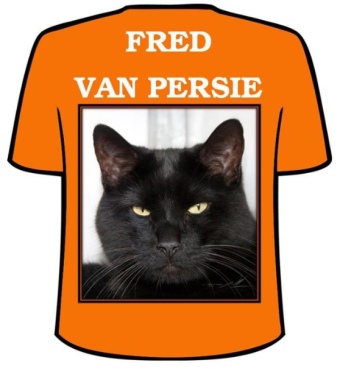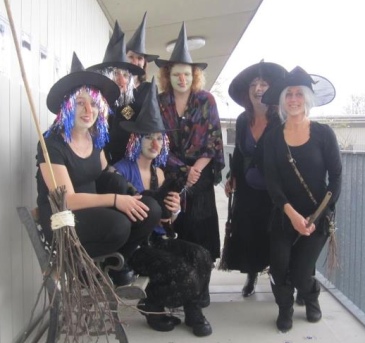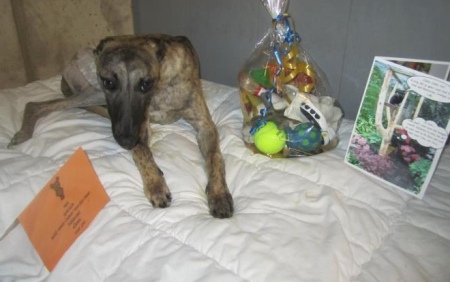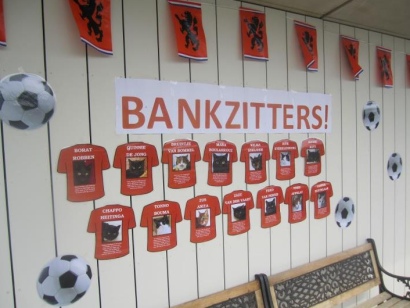Successful Facebooking for animal adoptions: Dutch shelter gets creative

‘Benchwarmer’ Fred van Persie, successfully adopted thanks to the creative efforts of Animal Shelter Amsterdam. / Photo: Animal Shelter Amsterdam
Animal Issues Reporter.org is back! Chief editor’s fried laptop forced us into a 9-day hiatus, but now we’re up and at ‘em again, starting with this fun look at a Dutch animal shelter by AIR’s European correspondent Anneloes Wagenaar Hummelinck.
By Anneloes Wagenaar Hummelinck
Every other year, the streets here in Holland turn orange—our national color. Time for Holland to try to score the World Cup/European Cup in soccer. Although we’ve only won the European Cup once, sometime long ago in the seventies, we keep hoping each new year will be the year.
Every company knows that the Dutch go crazy over orange soccer goodies, so they all try to get in on the orange action and introduce an orange variety of something: orange milkshakes by McDonald’s, an orange shirt with your name on it from Heineken, orange dresses by Bavaria.
You might think that all this orange, soccer-related craziness only interests commercial companies trying to make a profit. Think again. This year the Animal Shelter Amsterdam (ASA) took the opportunity to shine the spotlight on cats who have been in the shelter for a long, long time. And they did so creatively.
Benchwarmers
ASA put together a team of “benchwarmers” who were introduced to their Facebook fans one by one. Every cat was linked to a soccer player’s last name, with his or her picture pasted onto an orange shirt. So if the soccer player was Robin van Persie, and the feline benchwarmer was Fred, then he became Fred van Persie.
Every other day, one benchwarmer was introduced to the Facebook fans, complete with a description of the cat’s character in soccer terms. For instance: “Fred van Persie had his debut in our shelter on February 10, 2012. He is a curious player, who likes to thoroughly check out his opponent.”

ASA staff in full Halloween regalia – to attract attention for the animals.
Photo: Animal Shelter Amsterdam
This is not the only inventive Facebook initiative the ASA has put on their Facebook page. On Friday the 13th, they focus on black cats. All black cats in the shelter are adoptable with a discount, and some of the employees dress up as witches.
Programs like these have brought them national publicity.
Benefactors in the spotlight
ASA also makes sure to thank the hands that feed them.
“Thanks to the lovely lady who sent us this amazing food package for the cats, and some snacks for the dogs!” they crow on their website, featuring a picture of the donated goods. Although the well do-er might prefer to remain anonymous, he/she is publicly thanked and can see how happy they’ve made the people and animals at the shelter.
Efficient follow-ups

Zoef, found with a broken leg that needed surgery, was soon surrounded by gifts and cards from concerned supporters.
Photo: Animal Shelter Amsterdam
Although money is probably tight, ASA hardly ever asks for donations on their page. And when they do, they tell you what the money is for, for instance by introducing a dog or cat who needs a costly operation and telling their story. Zoef, for example, was a greyhound found in a ditch behind the shelter with a broken hind leg. When readers are shown what, or in this case, who their money is going to, they are much more willing to donate.
ASA keeps the information flowing with reports on how much has been raised so far for the particular animal, when they’ve reached their target they actually tell you that you can stop giving.
Afterwards, when Zoef had his operation and was recovering, they posted reports on how he was doing, including photos of him with the postcards that caring supporters had sent him.
Readers form emotional bonds with spotlighted animals
These efforts are highly successful, says ASA’s Max van Steijn. All the animals that have been in the Facebook spotlight are really sought after. Once people know the cat’s or dog’s story, they feel an emotional bond with that animal and want to adopt him or her.

After ASA spotlights animals with creative promotions, they are successfully adopted and are benchwarmers (‘bankzitters’) no more.
Photo: Animal Shelter Amsterdam
“But there are so many other animals in our shelter,” said van Steijn, “who all have their own story too, and who might be a much better match for those people. So, we don’t announce on Facebook when the animals are available for adoption, because then we would get a run on one animal, when we have so many others in need of a home too.”
The Facebook posts requesting that readers “please pitch in so they can fix my hind leg” tend to attraction generous donations, van Steijn said. Within a couple of hours, the shelter receives the amount needed. The shelter’s Facebook followers are very loyal and giving, he added. And thanks to their Facebook page, ASA has gotten a lot more regular donors from all over the country who send in a certain amount each month.
This sort of interaction, versatile content, and creative use of social media have attracted many new benefactors and gifts for the animals.
Meanwhile, Holland did not even make it into round two of the EC 2012. Sounds like the ASA benchwarmers have had a lot more success than the Dutch soccer team.
Check out ASA’s Facebook page.
More AIR from Anneloes Wagenaar Hummelinck:
Why cats and computers don’t mix
Anneloes Wagenaar Hummelinck is an online marketing and social media specialist with a Master’s degree in Communication and Information Sciences from the University of Groningen in Holland. She has adopted two cats—one of them a colossal seven-kilo fellow from Greece—and frequently helps rescue groups foster, place, and transport needy animals into new homes.
Please respect copyright law. Sharing AIR links really helps! But copying more than a couple of paragraphs of content without permission is a no-no. If you’d like to use one of AIR’s articles or one of our photographs, kindly contact us at [airinfo AT yahoo DOT com].
Copyright © 2012 Animal Issues Reporter and AnimalIssuesReporter.org.
All rights reserved.
Great article on a worthy cause – I look forward to the ASA posts <3
Thanks for sharing ellcxeent informations. Your website is so cool. I am impressed by the details that you have on this website. It reveals how nicely you perceive this subject. Bookmarked this website page, will come back for more articles. You, my pal, ROCK! I found just the info I already searched everywhere and just could not come across. What a great web-site.
Yellow lipped sea krait1.habitat: they live in the Indian and Pacific oneacs; they live in coral reefs and mangrove swamps; they nest on beaches and rocks; they live in shallow water2. eats eels and other fish and fish eggs3. they are 1-3 metres long4. they adapted from cobras5. its tail has adapted to look like its head to fool its predators
Yes, it’s true. Most shelters chrage for a lost dog. Some chrage daily, some don’t. In most cases though, it’s to compensate for housing your dog, feeding it, any shots they may have given it, etc Some shelters, as another poster said, will require a spay/neuter and a microchip to be done before releasing the dog, or they’ll have done so before you pick the dog up, and will ask for compensation for that. Keep in mind that any stray dog they bring in, is treated the same (even if you’ve reported your dog missing), and will receive the same vet care, etc as any other stray they bring in if they don’t have any current information about the dog’s vaccinations, spay/neuter, etc References :
This is a good tip particularly to those fresh to the blogosphere.
Simple but very precise information… Thank you for sharing this one.
A must read post!
I remmbeer that I remmbeer that when Stray mom cat was killed by car and there are two kittens went up to my sister and We have them for 5 weeks to find them a good home so we did! With a good help of Two kittens’s new owner. He paid everything food and milks etc, for two kittens to thrive. they was only 4 week old. Sad. I think they may remmbeer of their mom car run over. my sister saw body of it. i wasnt there. she told me . It was very nice for her to bought them in home.